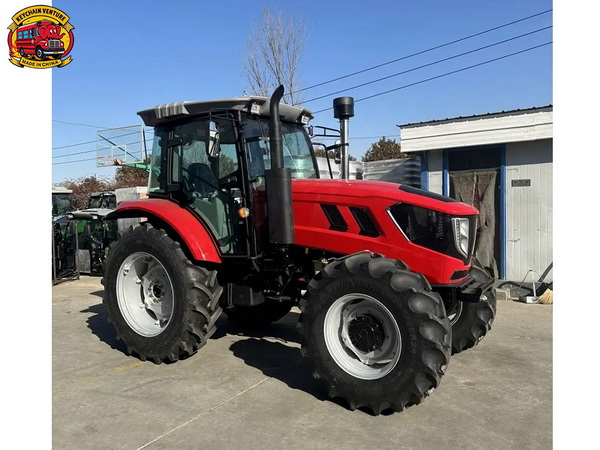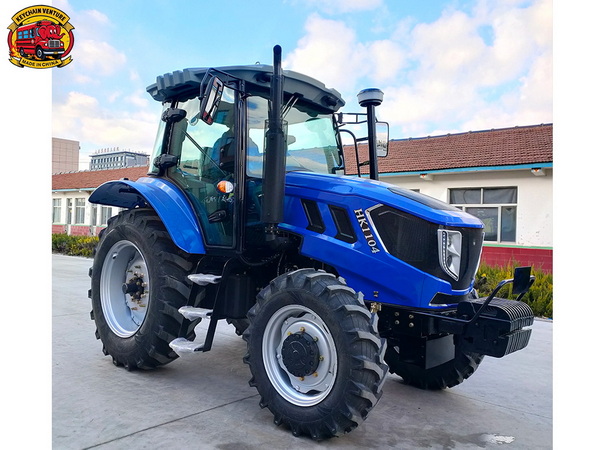Views: 222 Author: Amanda Publish Time: 2025-09-07 Origin: Site








Content Menu
● Understanding the Value of a Used Tractor
● Factors Affecting the Price of a Used Tractor
>> Horsepower and Specifications
>> Condition and Maintenance History
>> Attachments and Additional Features
● Researching Market Prices for Used Tractors
● Using Online Tools and Valuation Guides
● Inspection Tips Before Pricing or Buying
● Negotiation Strategies When Pricing a Used Tractor
● FAQ
>> 1. How does tractor horsepower affect the resale price?
>> 2. What is the most significant factor in pricing a used tractor?
>> 3. Are online valuation tools reliable for pricing used tractors?
>> 4. Should I consider attachments when pricing a used tractor?
>> 5. How can I verify the hours of use on a used tractor?
Pricing a used tractor is a crucial task for both buyers and sellers in the agricultural and transportation industries. As a leading commercial vehicle supplier, KeyChain Venture Co., Ltd. understands the complexity involved in determining a fair, accurate price for a used tractor. Whether you are upgrading your machinery or entering the market for the first time, this comprehensive guide will help you price a used tractor effectively by considering multiple factors, tools, and current market trends.

When pricing a used tractor, the primary goal is to establish a fair market value that benefits both seller and buyer. Unlike new tractors, a used tractor's value can depreciate significantly due to wear, age, and new technology improvements. However, certain used tractors retain value due to brand reliability, durability, or rarity of the model.
The value of your used tractor hinges on various intertwined factors like condition, usage, and market demand — this is why pricing isn't just about calculating a number but understanding value holistically.
Evaluating a used tractor correctly not only helps prevent overpaying but also ensures you don't undersell your equipment when intending to sell. A well-priced tractor attracts genuine buyers swiftly, leading to quicker sales and satisfied parties on both ends.
Generally, the older a used tractor is, the lower its price will be; however, hours of use often provide better insight than age alone. A well-maintained tractor with fewer hours might be worth more than a newer tractor with heavier usage.
For example, a 10-year-old tractor with 2,000 hours of use in excellent condition may be priced higher than a 5-year-old model with 5,000 hours and frequent repairs. This is because tractors with lower hours typically indicate less wear on major components such as the engine and transmission, suggesting longer remaining service life.
Certain brands command premium prices due to their reputation for reliability and parts availability. Manufacturers like John Deere, Kubota, Case IH, and New Holland are renowned for their durability, efficiency, and robust dealer networks. These brands tend to maintain higher resale values.
Additionally, popular tractor models known for specific tasks such as heavy-duty farming, construction, or utility applications often attract better prices. Buyers prefer models with proven performance records and ease of maintenance.
Horsepower (HP) is a critical determinant of a tractor's capability and, subsequently, its market value. Higher horsepower tractors designed to manage larger implements or more demanding workloads typically command higher prices.
Specifications such as transmission type—manual, hydrostatic, or powershift—four-wheel-drive capability, fuel efficiency, and emissions standards also influence pricing. Advanced features like electronic controls and ergonomic designs add to value.
Condition is a key factor that greatly affects pricing. A tractor in excellent mechanical and cosmetic condition will always be worth more than one needing significant repairs or with visible wear and tear. Components like the engine, transmission, hydraulics, and electrical systems should be functioning smoothly.
Maintenance history often serves as a strong indicator of condition. A tractor with a comprehensive service record showing regular oil changes, filter replacements, and repairs suggests diligent upkeep. Sellers who provide clear maintenance logs can justify higher asking prices, building buyer confidence.
Visual cues such as rust-free bodywork, intact paint, and good tire conditions further enhance the tractor's perceived value.
Attachments and accessories included with a used tractor add considerable value. Loaders, backhoes, mowers, bale forks, and other implements reduce the buyer's additional costs and often make the package more attractive.
Beyond attachments, additional comfort and usability features also impact price. Modern tractors equipped with climate-controlled cabs, GPS guidance, automatic steering, and real-time diagnostics tend to fetch higher prices than stripped-down models.

Before setting a price for a used tractor, conducting thorough market research is essential to understand current supply and demand dynamics.
- Online Marketplaces: Specialized websites for agricultural machinery list used tractors from across the country and globally, offering insight into asking prices for tractors of similar age, hours, and models.
- Local Dealers and Auction Houses: Dealers can provide appraisals based on regional demand, while auction results reflect real selling prices, often much lower than asking prices. Seasonality also plays a role as prices may dip outside of planting or harvest seasons.
- Industry Trends and Reports: Agricultural organizations and equipment valuation companies periodically publish reports detailing depreciation rates, resale values, and buying trends. These resources give you a macroeconomic picture, helping to make strategic pricing decisions.
Understanding geographical factors is also important—tractors priced in regions with active farming may attract better prices than in areas with limited agricultural activities.
In today's digital age, online valuation tools tailored for agricultural equipment can greatly simplify the pricing process. These tools collect data from sale listings, auction results, and dealer prices to generate current market values for used tractors.
Typically, these platforms require inputs such as:
- Tractor make and model
- Year of manufacture
- Hours of operation
- Condition
- Attachments
The tool then provides a suggested price range, which acts as a reliable starting point for negotiations.
Though helpful, online valuations should not replace careful physical inspections. They serve best when combined with your own research and expert advice from qualified mechanics or dealers.
Whether you are selling or purchasing a used tractor, conducting or arranging a thorough inspection is critical to support or challenge your price expectations.
Checklist for inspection:
- Engine and Transmission: Start the engine and check for unusual noises, smoke, or vibrations. Inspect transmission shifting for smooth operation and clarity of gear engagement.
- Fluid Levels and Leaks: Check oil levels, coolant, hydraulic fluids, and observe the undercarriage for leaks or stains indicating maintenance issues.
- Tires and Wheels: Verify tire tread and look for cracks. Uneven wear can hint at suspension or alignment problems.
- Hydraulics and Electrical Systems: Test all hydraulic controls, lift arms, and attachments. Confirm lights, gauges, and battery are working correctly.
- Visual and Structural Condition: Look for rust, dents, cracks in frame or body panels, and condition of cab interior.
- Documentation Review: Request and examine maintenance logs, repair invoices, and registration papers to assess upkeep and legal compliance.
Arranging a professional machinery inspection can reveal hidden defects that impact price greatly and prevent costly surprises post-purchase.
With your research and inspection data in hand, it's time to enter negotiations confidently.
For sellers:
- Present documented maintenance records and emphasize low hours or recent repairs.
- Highlight attachments or upgrades that add value.
- Set a realistic asking price based on research but leave room for reasonable offers.
- Be aware of market trends; if many similar used tractors are listed, pricing competitively can attract faster buyers.
For buyers:
- Point out any issues uncovered during your inspection to negotiate a better deal.
- Use offline seasons or slow market periods to gain bargaining leverage.
- Understand the seller's urgency and adaptability.
Negotiations should focus on transparency and factual data rather than emotional appeals, resulting in successful transactions for both parties.
Pricing a used tractor is a nuanced process that requires comprehensive consideration of many factors including age, usage, brand reputation, horsepower, condition, and accessories. Accurate pricing balances ensuring competitive market appeal while recovering fair value.
Through diligent research involving market analysis, online valuation tools, and thorough inspections, both buyers and sellers can navigate the pricing process with confidence. Proper pricing leads to faster sales, maximizes returns, and ensures the acquisition of reliable, efficient machinery.
KeyChain Venture Co., Ltd. is dedicated to helping commercial vehicle customers source and price high-performance tractors and heavy-duty trucks fitting their operational requirements. With expertise and attention to detail, we empower your business to thrive in dynamic markets.

Higher horsepower tractors usually have a higher resale price because they can perform more demanding tasks efficiently, making them more desirable.
Condition and maintenance history are arguably the most crucial. A well-maintained tractor shows better longevity and reliability, increasing its value.
Yes, when used alongside market research and physical inspection, online valuation tools provide accurate price ranges based on recent sales data.
Absolutely. Attachments like loaders or backhoes add considerable value because they save buyers additional purchase costs.
Hours of use are typically recorded on the tractor's hour meter or documented in maintenance logs. Always double-check these with service records.